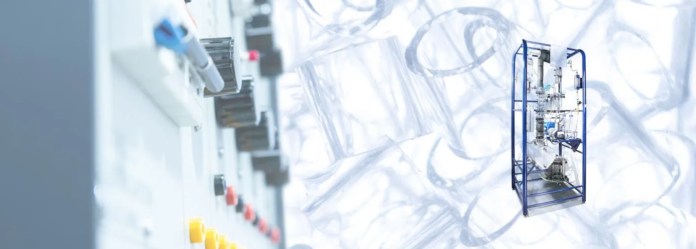Distillation is a fundamental process in chemical engineering, separating components in a mixture based on differences in boiling points. To achieve this, distillation columns play a critical role, facilitating precise separation for industries such as pharmaceuticals, petrochemicals, food and beverage, and academia. If you want to learn about distillation columns, their working principles, types, and applications, this guide from Armfield will provide you with all the essential details.
What is a Distillation Column?
A distillation column is a vertical vessel used in industrial distillation processes to separate liquid mixtures into individual components. This is accomplished by heating the mixture and utilizing differences in component volatilities. The column consists of trays or packing materials that provide surfaces for vapour-liquid contact, facilitating the separation process.
At Armfield, we specialise in designing and manufacturing distillation columns tailored for research, education, and industry applications. Whether you need a small-scale unit for academic study or a sophisticated column for industrial-scale separation, our solutions deliver precision and reliability.
How Distillation Columns Work
- Heating the Mixture – A heat source, such as steam or an electric heater, supplies energy to the liquid mixture.
- Vapour Formation – As the temperature increases, the more volatile components evaporate first.
- Condensation & Separation – Vapours rise through the column and condense at different heights, depending on boiling points.
- Collection of Products – The separated components are collected at different stages, with purer fractions obtained at the top.
Types of Distillation Columns
There are several types of distillation columns, each suited for specific applications. At Armfield, we offer a range of high-quality distillation systems, including:
1. Batch Distillation Columns
- Used when smaller quantities need to be separated.
- Common in research laboratories and specialty chemical production.
- Provides flexibility for varying feed compositions.
2. Continuous Distillation Columns
- Ideal for large-scale, industrial applications requiring continuous separation.
- Higher efficiency with consistent product output.
- Used in oil refining and beverage production.
3. Fractional Distillation Columns
- Incorporates multiple trays or packing materials for precise separation.
- Essential in refining crude oil into different fuel components.
- Used extensively in pharmaceutical manufacturing.
4. Vacuum Distillation Columns
- Lowers boiling points by reducing pressure, preventing thermal degradation.
- Suitable for heat-sensitive materials such as essential oils and fine chemicals.
At Armfield, we provide expert guidance in selecting the right distillation column to match your process requirements, ensuring optimal performance and efficiency.
Applications of Distillation Columns
Distillation columns are used in a variety of industries, including:
- Petrochemical Industry – Refining crude oil into gasoline, diesel, and kerosene.
- Pharmaceuticals – Producing high-purity solvents and active ingredients.
- Food & Beverage – Manufacturing alcoholic beverages like whisky and vodka.
- Water Treatment – Purifying water through desalination processes.
- Academic Research – Teaching students about separation processes in universities and colleges.
Why Choose Armfield for Distillation Columns?
As a trusted leader in engineering and laboratory equipment, Armfield offers unparalleled expertise in distillation columns. Our solutions are designed to deliver:
- High Performance – Precision engineering ensures efficient separation.
- Scalability – Options available for both laboratory and industrial applications.
- Durability – Built with high-quality materials for long-term reliability.
- Customisation – Tailored solutions to fit your specific process needs.
Our team of experts is committed to helping you choose the best distillation column for your operations.
Frequently Asked Questions
1. What is the difference between batch and continuous distillation?
Batch distillation processes small, specific volumes in separate cycles, making it ideal for research and small-scale applications. Continuous distillation, on the other hand, operates without interruption, handling large volumes efficiently in industrial settings.
2. How do I choose the right distillation column for my needs?
Selecting the right distillation column depends on factors such as the type of mixture, desired purity levels, and processing scale. At Armfield, we offer expert consultation to help you make the best choice.
3. What industries benefit from distillation columns?
Distillation columns are widely used in petrochemicals, pharmaceuticals, food and beverage, and water treatment industries. They enable precise separation of mixtures into pure components.
4. How do vacuum distillation columns work?
Vacuum distillation lowers the operating pressure, reducing the boiling points of components. This is particularly useful for heat-sensitive substances that would degrade at higher temperatures under atmospheric pressure.
Contact Us for Expert Distillation Solutions
At Armfield, we provide state-of-the-art distillation columns tailored to your industry needs. Whether you’re conducting academic research, manufacturing pharmaceuticals, or refining petrochemicals, we have the perfect solution for you.
Get in touch with our team today to discuss your requirements and find the ideal distillation system for your application.


























